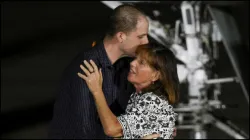US-Russia prisoner exchange: A look at previous key East-West swaps
Complex discussions for over a year resulted in the largest prisoner exchange between the West and Russia since the Cold War, involving 24 prisoners. There have been four high-profile swaps between the US and Russia before, including 14 prisoners in a 2010 deal.

US-Russia prisoner exchange: After tense secret negotiations for over a year between Russia and Western countries, including the United States, in the midst of global tensions over Moscow's invasion of Ukraine, both sides hammered a historic prisoner exchange deal, the largest in post-Cold War period, involving 24 prisoners. The US on Thursday welcomed four prisoners detained in Russia for years, while Moscow greeted eight prisoners held in various Western countries.
The United States said it had negotiated the trade with Russia, Germany and three other countries. The US welcomed American journalist Evan Gershkovich, former US Marine Paul Whelan, Russian-American journalist Alsu Kurmasheva and Russian opposition politician Vladimir Kara-Murza, who were received by President Joe Biden and VP Kamala Harris in Maryland.
On the other hand, Russian President Vladimir Putin gave a hero's welcome to eight prisoners, thanking them for their 'loyalty to the Motherland' and promising them state awards. These included Vadim Krasikov, a hitman convicted by a German court of killing a former Chechen militant in a Berlin park, Vladislav Klyushin and Roman Seleznyov - convicted of cyber crimes in the US- and a Russian family, Artyom and Anna Dultseva and their two children accused of being "illegals".
Key figures in the prisoner exchange
High-profile names of those who have been released from detention in Russia and Western countries including Gershkovich, a Wall Street Journal reporter arrested and sentenced to 16 years on espionage charges, all denied by the US government and his employer. Whelan, a former Marine and corporate security executive, was also accused of espionage and sentenced to 16 years in 2020.
Prominent Kremlin critic Ilya Valeryevich Yashin was serving a sentence of 8.5 years for criticising Russia's war in Ukraine, and has now been released to Germany. Rico Krieger, a German medical worker, was convicted of terrorism charges in June and sentenced to death. He was pardoned on Tuesday by Belarusian President Alexander Lukashanko.
The most high-profile prisoner to return to Russia is Krasikov, convicted of killing Zelimkhan “Tornike” Khangoshvili, a 40-year-old Georgian citizen of Chechen ethnicity, in a Berlin park. He was convicted in 2021 and sentenced to life imprisonment. The German judges concluded it was an assassination ordered by the Russian security services.
A look at previous prisoner swaps
- Brittney Griner and Viktor Bout (2022): The US and Russia negotiated a prisoner swap for American basketball player Brittany Yvette Griner in exchange for Russian arms dealer Viktor Anatolyevich Bout. Friner was arrested at a Moscow airport for carrying vape canisters containing cannabis oil. She was convicted of drug charges and sentenced to nine years in prison. On the other hand, Bout was arrested in 2008 in a US sting operation in Thailand for offering to sell surface-to-air missiles. He was convicted of conspiring to kill US nationals and sentenced to 25 years. The deal was controversial for its wide disparities.
- Trevor Reed and Konstantin Yaroshenko (2022): This prisoner exchange took place only two months after the Russia-Ukraine war began. Former US Marine Trevor Reed was arrested in 2019 for assaulting a police officer while allegedly drunk and was given a sentence of four years, a harsher sentence even for Russia. Yaroshenko, a pilot, was arrested in 2010 in Liberia over a cocaine distribution scheme. He was extradited to the US and sentenced to 20 years.
- Russian 'sleeper agents' (2010): US officials arrested ten Russian nationals in June 2010 on suspicion of being "sleeper agents" living under false identities without specific espionage missions. This included famous Russian model and media personality Anna Chapman, who pleaded guilty to a charge of conspiracy. They were exchange at the Vienna Airport for four Russians imprisoned in their homeland, including Sergei Skripal, a double agent working with the British intelligence service.
- Rudolf Abel and Francis Gary Powers (1962): Known as the most dramatic swap of the Cold War era, Abel and Powers were exchanged on February 10, 1962, on the Glienicke Bridge. Abel, working with Soviet intelligence services, was arrested on espionage charges in the US in 1957 and sentenced to 30 years. Powers was piloting a photo reconnaissance plane that was shot down over central Russia in 1960.
How the prisoner exchange will impact US-Russia ties?
The last major exchange between the United States and Russia, in 2010, involved 14 prisoners. The two countries had a high-profile exchange in December 2022, swapping US basketball star Brittney Griner, sentenced to nine years for vape cartridges containing cannabis oil in her luggage, for arms dealer Viktor Bout, who was serving a 25-year sentence.
The deal provided the Biden administration with a marquee diplomatic success as the US presidential campaign pitted Harris against former Republican President Donald Trump, entering its final months. However, the multi-country deal appeared to be a one-time exchange that did not reset the antagonistic US-Russia relationship.
The historic deal came at a significant cost for the US as Russians convicted of serious crimes were freed, raising fears of more hostage-taking by American foes. That concern quickly exposed Biden to attacks from Republican opponents. However, the swap provided a much needed foreign policy accomplishment for Biden amid heighted global tensions.
(with inputs from agencies)
ALSO READ | 'Loyalty to motherland': Putin welcomes prisoners freed after landmark deal with West, promises state awards